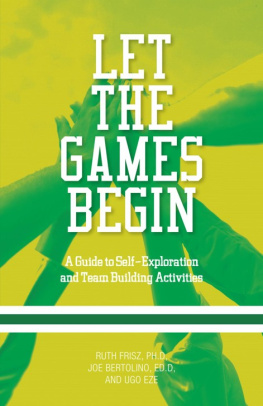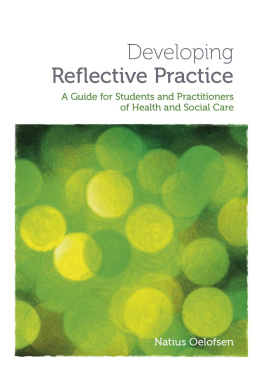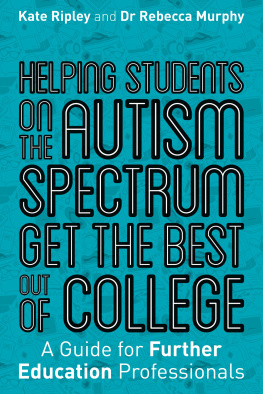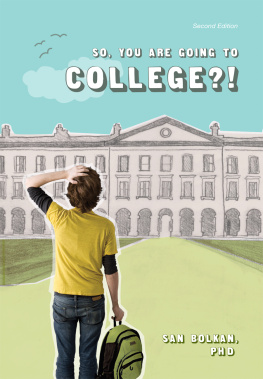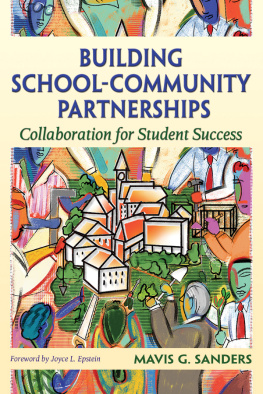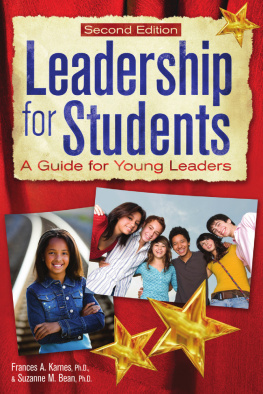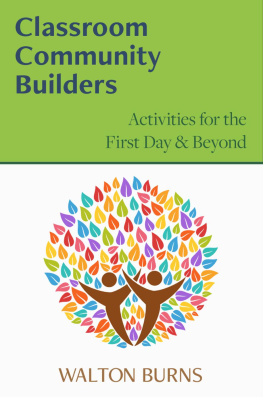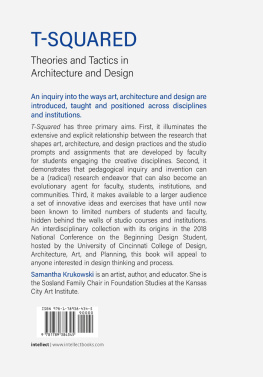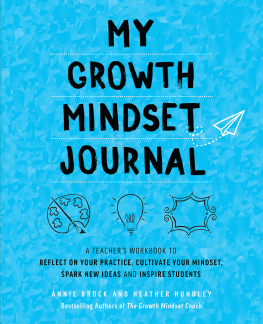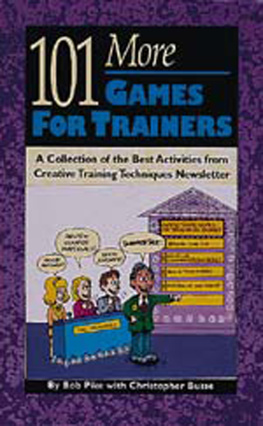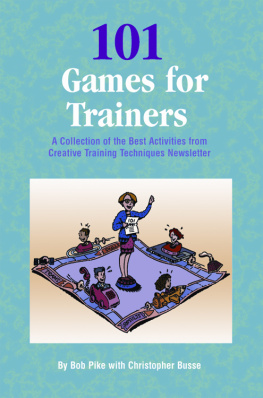LET
THE
GAMES
BEGIN
A Guide to Self-Exploration
and Team Building Activities
RUTH FRISZ PH.D
JOE BERTOLINO ED.D
UGO EZE
iUniverse, Inc.
Bloomington
Let The Games Begin
A Guide to Self-Exploration and Team Building Activities
Copyright 2012 by Ruth Frisz, Ph.D, Joe Bertolino, Ed.D, and Ugo Eze.
All rights reserved. No part of this book may be used or reproduced by any means, graphic, electronic, or mechanical, including photocopying, recording, taping or by any information storage retrieval system without the written permission of the publisher except in the case of brief quotations embodied in critical articles and reviews.
iUniverse books may be ordered through booksellers or by contacting:
iUniverse
1663 Liberty Drive
Bloomington, IN 47403
www.iuniverse.com
1-800-Authors (1-800-288-4677)
Because of the dynamic nature of the Internet, any web addresses or links contained in this book may have changed since publication and may no longer be valid. The views expressed in this work are solely those of the author and do not necessarily reflect the views of the publisher, and the publisher hereby disclaims any responsibility for them.
Any people depicted in stock imagery provided by Thinkstock are models, and such images are being used for illustrative purposes only.
Certain stock imagery Thinkstock.
ISBN: 978-1-4759-3519-6 (sc)
ISBN: 978-1-4759-3520-2 (ebk)
Library of Congress Control Number: 2012912074
iUniverse rev. date: 07/11/2012
Contents
Whatever you are, be a good one. Abraham Lincoln
Quick Tips from the Authors
Dr. Ruth says:
The activities found in this manual were developed over thirty years in the context of a service learning educational experience, which was part of the Peer Program at Queens College. The Program consists of three credit-bearing courses: Introduction to Counseling and Advisement, Practicum in Counseling and Advisement, and Advanced Practicum in Counseling and Advising The first course is an educational training course where the students who are selected to become Peer Counselors are trained in counseling techniques and skills as well as communication and interviewing techniques. During the second semester course, the students actually do peer counseling and this is one of their practicum experiences. The emphasis in this course is supervision by licensed staff psychologists and counselors, and topic-related discussions on such issues as stress, depression, suicide, culture, and adolescence to name a few. The third and final semester of the program involves continued development of counseling skills, learning how to supervise and teach, the center piece of this course is the semi-annual retreat which is a requirement for all the students in the program.
The third semester students create, plan, organize, implement and evaluate the weekend under the supervision of the professor who teaches the course and is also the program coordinator. The Director of Counseling assists with this project and also trains the small group facilitators. The weekend is the term project for the third semester students. Approximately 60 students and 4 staff attend this weekend every semester.
The weekends focus on leadership development, interpersonal communication and team building. The Peer Counselors, throughout the years, have participated in a series of activities designed around a specific theme. These are conducted in large and small groups and each are processed by group facilitators who are students and are trained in group facilitation prior to the weekend.
The weekends allow the participants to come together for an opportunity to learn about and participate in an educational activity that encourages collaboration and involvement between and among the students, the faculty coordinator and the professional counselors.
This model and these activities can be used by many different types of organizations including, but not limited to educational institutions, businesses, non-profit organizations, and religious institutions.
The activities lend themselves to adjustments and revisions depending on the goals of the workshop, conference, weekends or in-service meetings. This manual is designed to offer ideas and suggestions to those who want to provide this kind of opportunity to their employees, students, administrators, management teams or others.
Dr. Joe says:
If there is any advice I can give a program organizer, facilitator or participant when approaching any of these activities is to HAVE FUN! Assembling a program and participating in it shouldnt feel like a chore. Regard it as an opportunity. In a fast paced society where our technology is only hurtling us faster into a realm of impersonal cyber communication, sitting down with several other people and expressing thoughts and emotions, revealing aspirations and fears, and coming to terms with victories and losses, are a rarity. So cherish this opportunity.
Ugo says:
During my tenure at Queens College, I was presented with the opportunity to become involved in various programs that facilitated leadership training and self-exploration. My long-term participation with these programs has equipped me with direct knowledge of the student/participant point of view. While assembling this book, I was able to operate from a facilitator point of view. I am now able to speak candidly from both standpoints. Through this, I have come across a few simple ideas that will aid in the creation of a successful program. Now lets get this party started!
Kicking Things Off
So you intend on creating a program for a conference, seminar, meeting, gathering, shindig or whatever you prefer to call it? This is great! However, some may now wonder, where do I go from here? but have no fear! We are here to assist you in this endeavor. We have listed a few concepts to consider when formulating your program. If something appeals to you and fits your needs, use it. If it doesnt, leave it and move on. Agreed? Awesome. Lets get this party started.
Setting a Goal
This is a concept that is often overlooked by many directors when creating a program, conference, seminar etc. Simply having a goal in mind will leave no room for ambiguity when its time to determine if your goal was reached. It is better to work all that out from the beginning. State your goal for the program and then work directly towards it through the exercises with assistance by the facilitators and the participants. Precision can produce wonders. For instance, if the goal is to facilitate leadership skills or team building, then the activities chosen should reflect this.
Creating a Theme
Creating themes will aid in establishing and reaching the goals established. There are two different types of themes which are subject and concept themes.
The subject theme concerns the type of topics that will be addressed during the program. Possible subject theme choices can be about personal values, culture (however you choose to define it), religion, understanding social biases, stereotypes, communication, decision making, or even learning to relax.
It is imperative that you identify what type of culture you are aiming to reach. For example, if you are the CEO of a financial advising company, who is looking to boost employee morale, it may not be very productive to discuss underground street fighting culture and etiquette. While it may be very entertaining and enlightening, it is a better idea to discuss concepts related to your field.
Selecting a concept theme is a great way to have fun with programming. Some of the themes from our past retreats were Time Travel, Survivor, Hollywood Films, Island Vacations, Time Capsules, Around the World in 3 Days, The Mask, Shakespeare, and Fairy Tales to name a few.
Next page
